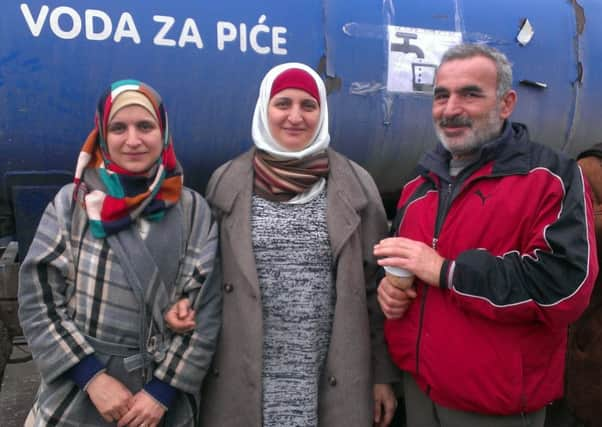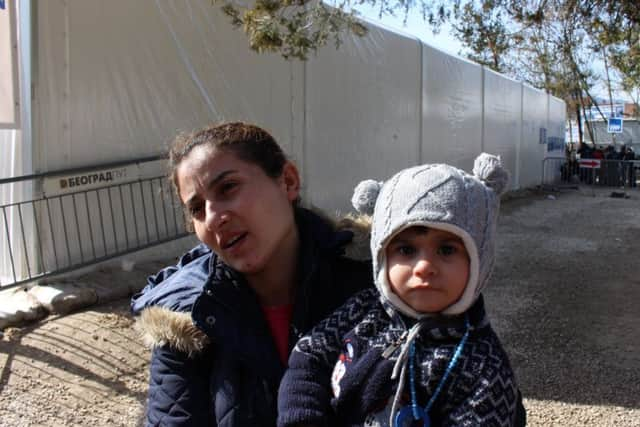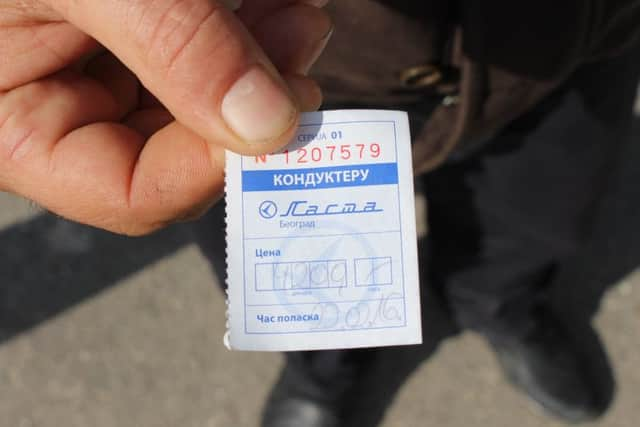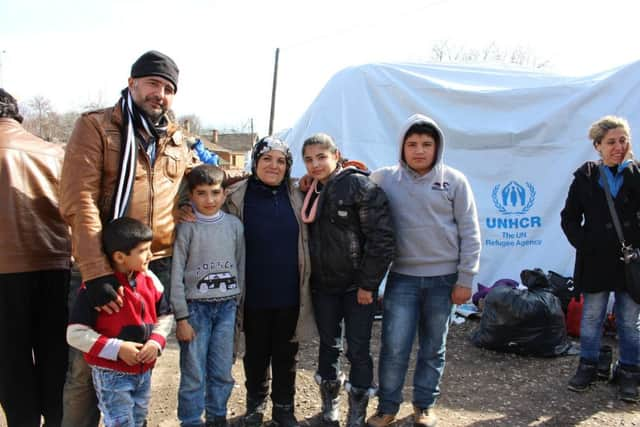Special report: Refugees wait for their ticket at Serbian border to better life


WHEN 26-year-old Marwa went to her local hospital in Syria to give birth to her son, she could never have predicted what was about to happen.
“The army came in and there was a fight,” she remembers. “They started firing. I was hit.”
Advertisement
Hide AdAdvertisement
Hide AdDoctors managed to save Marwa and deliver her child safely, but the baby suffered brain damage from his injuries and is now, aged four, unable to walk or talk.


He is in Munich, Germany, with his father, who took him there last year in a bid to find him urgent medical treatment no longer available in war-torn Syria. Marwa, waiting at a refugee processing centre in Serbia with her father and pregnant mother, is hoping to join them.
“He cannot cope with the noise from the war, the constant bombs and air strikes,” she says. “He does not understand and it traumatises him. We had to get him out as quickly as possible. But I have not seen him for six months.”
At the one stop centre in Presevo, in southern Serbia, hundreds of other families are waiting for their papers to be processed, before they are given permission to continue their journey north, part of the long and arduous route to western Europe through the western Balkans.
Iraqi Feyzah, 22, is waiting patiently for her turn to be registered by Serbian authorities, sitting on a patch of scrubland at the centre – erected just five months ago on the site of a former factory close to the Macedonian border.


She has been travelling for the past month with her extended family – a group of 12 adults and nine children. The youngest in the group is her sister’s one-year-old daughter, Dima, who giggles as she is passed around the family. The oldest is Feyzah’s 94-year-old grandmother, who impressively marches unaided to the processing centre, tucking her headscarf around her neck. But the walk is nothing compared to the family’s trek through Turkey, which they undertook on foot.
Their lives in Iraq had become impossible. “Family members were killed, our home was destroyed. We were scared for our own safety,” she says.
Kawkab, 20, from Aleppo in Syria, moved eleven times in a bid to live peacefully in a part of the city which was not controlled by hostile groups.
Advertisement
Hide AdAdvertisement
Hide Ad“Every time, we were hoping that this part of the city would be safe,” she says. “Then the food supplies were cut off. There was nothing. No bread, no milk. We were starving. What food there was became very expensive, you could not afford it.


“We just want to live like normal people again.” She smiles. “We just want peace for the whole world.”
Once the families have been processed and their papers stamped, they wait at a makeshift bus station at the back of the site – or wait for a refugee train to arrive.
More than a dozen buses are lined up, ready to take the refugees on the next stage of their journey: north, to Adasevci, where they will then cross the border into Croatia from the nearby Sid train station.
Smoking a final cigarette before his bus departs, I meet Taher. He is travelling with his wife and three sons after constant bombing in his hometown of Idlib, Syria, forced the family to flee. The final straw came when a huge bomb landed at the end of his street, destroying the homes of many of his neighbours - and killing friends.


“We have sold everything we had – everything,” says Taher, who has paid 35 euros per person – including the children – to get a space on the bus. Some of the non-governmental organisations working in the area have a budget to buy tickets for those who cannot afford the fare.
“Before the war, I was an engineer, my wife was an English teacher, but I have been without a job for four years. In Syria now, there is no work for an engineer. We have destruction everywhere, not construction.” His smile wavers for a minute. “We are searching for peace,” he says.
But refugees are not the only people waiting at the makeshift bus station at Presevo. Bus driver Mireslav has been seconded from his usual route to drive refugees from the southern border with Macedonia to the north of Serbia, where they leave for Croatia.
Advertisement
Hide AdAdvertisement
Hide AdThe buses are lined up, ready to be filled with refugees once they have been processed through the one stop centre. When the centre is flooded with thousands of refugees from one train, it can take days – to ensure everyone has been registered.
And until Mireslav’s bus is full, he is unable to leave. “Sometimes I sleep in my bus for two, maybe three, days,” he says. “I hope to leave tonight.”
A Syrian woman, Rubah, is struggling with her 18-month- old baby, who is exhausted from the long journey. “My biggest wish would be that we could return to Syria,” she says. “That is my home. But that is not going to happen now.”


At the station, a smiling woman with sparkling brown eyes approaches us and asks if we know when the next train will arrive. The train is cheaper than the bus, at just 15 euros per person, but it takes around two hours longer.
Ranya has been waiting, with her four children and husband, Rezah, a tailor, since 3am, when their train arrived from Macedonia. They are all exhausted.
But what is most difficult, she says, is that they have no idea when they will leave. “It could be in five minutes, it could be tomorrow, we don’t know,” she says.
Her middle son, Rojan, nine, can hardly read or write, she says. “He has had no school,” she explains. “All children of five years or younger, all they know is the war. When they play, they talk of bombs, of aeroplanes, of death.”
Today’s refugees are lucky. After less than 24 hours waiting in the Presevo centre, they are packed onto trains and buses and begin their journey north, arriving in Adasevci an arduous nine hours later.
Advertisement
Hide AdAdvertisement
Hide AdBy car, Adasevci is less than five hours away. The next morning, I arrive at the northern border camp – another centre run by the Serbian government – to see some familiar faces. Taher waves at us as we arrive at the centre. He is still smiling. The long journey was tiring, he says. But they are glad to be on their way.
The refugees are given soup, coffee and a chance to recharge their mobile phones. Banks of plug sockets have been set up inside the centre, a disused former motel building on the motorway near the Croatian border. Free wifi in this centre is provided in a joint venture between BT and Edinburgh-based Mercy Corps.
A “child-friendly space”, essentially a small nursery – where children have access to toys and games, and young mothers have a clean place to change nappies and breastfeed their babies – is run by World Vision, which also hands out food parcels to the refugees on their buses.
Taher is stretching his legs outside of the bus. He tells me his brother is living in Germany, in a refugee camp. I ask if he hopes to be placed in the same camp as his brother. He looks surprised.
“I hope, I think I will,” he says. He looks to the aid workers from World Vision, who are accompanying me on my visit, his face worried. “I can, can’t I?” But no-one can answer that. The situation across Europe changes on a daily basis. The refugees are at the mercy of border controls, quotas and government policies.
• To learn more about the aid agency World Vision’s response to the Syria Crisis, visit www.worldvision.org.uk/Syria